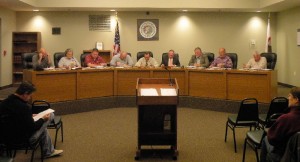Leonard Black campaigned on the introduction of term limits during his successful 2013 bid to oust 27-year mayor George Chance.
Illinois state law, however, does not allow a town to set term limits. As an alternative, Village Board Trustee Kerry Davis proposed an ordinance that would have created a November ballot measure allowing Caseyville voters to determine if they wanted to change the length of term for elected officials from four years to two years.
“It’s been 16 months (since the election),” Davis said. “I don’t know if that was just campaign rhetoric or what.”
When discussion began, Trustee Rick Casey Jr. asked a series of questions of fellow Board members. Had anyone checked with St. Clair County to find out if the change would increase Caseyville’s election costs? Did any Board member find out how many other municipalities in Illinois have two-year terms for elected officials? Does anyone know how much it would cost the village?
After no one responded to Casey, Black asked if anyone had an answer. Casey offered that he could answer his own questions.
Under certain circumstances, Caseyville may have to pay more for elections, Casey said. The Illinois Election Board had informed him that there are only three towns in the state with officials elected to two-year terms, Casey said. All three towns were considering changing to four-year terms, he told fellow Board members.
“This doesn’t solve anything,” Casey said.
Trustee Wally Abernathy said there were many unhappy people in Caseyville. Putting the measure on the ballot would be one way to allow citizens to remove someone they did not approve of more quickly.
Black said he believed in term limits, which was part of his campaign, but he was unsure if it was the deciding factor in the election. Black defeated Chance by four votes.
Davis reminded the mayor that state law did not allow the Board to set term limits.
“The only thing in state statute is what we have before us,” Davis said.
Black said he was concerned that an official could be removed for a bad decision or two.
“We might be good Board members, or whatever, but we’d get throwed (sic) out for one or two bad decisions,” Black said.
The proposed ordinance was to let the voters decide if they want to limit the terms, Davis said.
“It’s not our choice. When they go to the polls, it’s their decision,” Davis said.
Speaking during the meeting, Black said two years is not long enough to learn a new position in village government. After the meeting, Trustee GW Scott raised a similar point.
“It’s hard to get something done in four years, let alone two,” Scott said.
Several on the board, including Davis, noted that it would be difficult for officials to find the time and money to run for office more frequently. Similar complaints are common about elections for Illinois and United States House of Representatives, who have two-year terms. Every third election for an Illinois State Senate seat is a two-year term, with the other two elections for four-year terms.
When the discussion was complete and a vote called for, Davis, Abernathy and Ron Tamburello voted in favor of the proposed ordinance. The three trustees seated to the mayor’s right, Scott, Brenda Williams and Casey all voted against it.
Following the vote, all eyes were on Black, waiting for his deciding vote. Black, though, started to move on to the next item, before several board members informed him that he needed to vote to break the tie.
“Oh, well I vote ‘no’,” Black said. And with that, the measure failed.
If the citizens of Caseyville support the ordinance, they still have an option. As Davis reminded the Board during discussions, a successful petition drive could get the measure on a future ballot.
If the measure had passed and voters approved it in November, Casey, Davis and Tamburello would have been the first impacted by the change.




